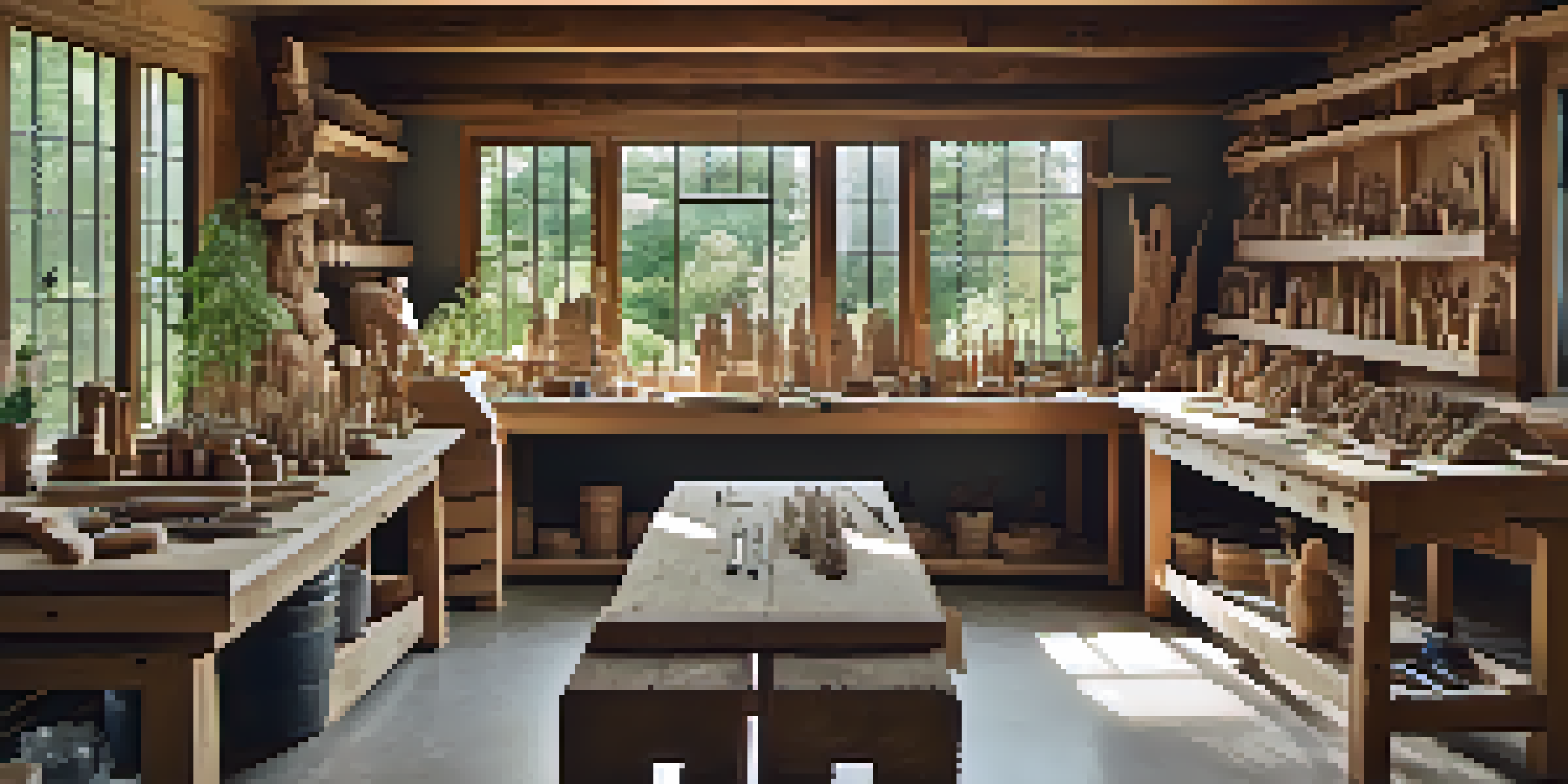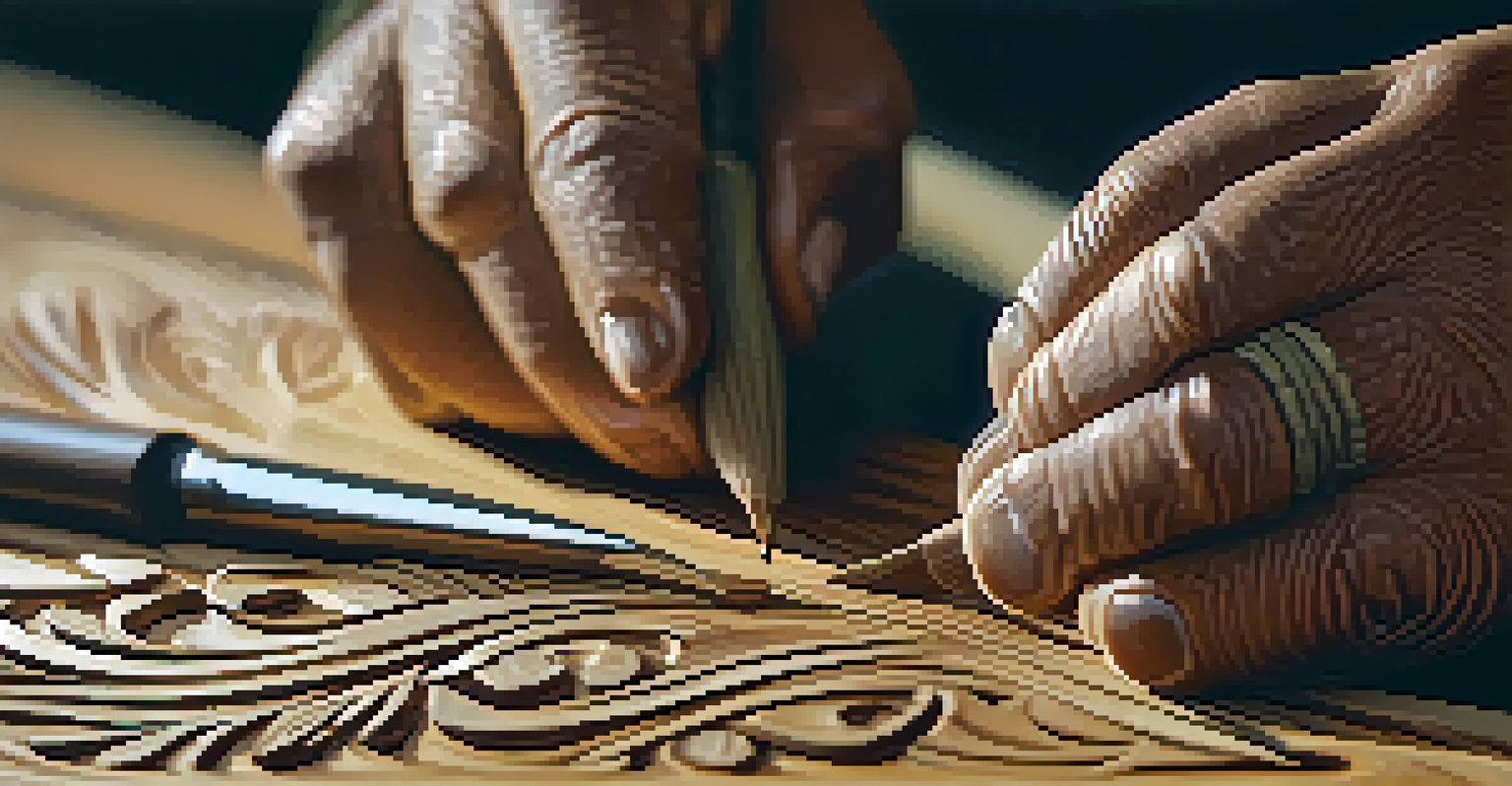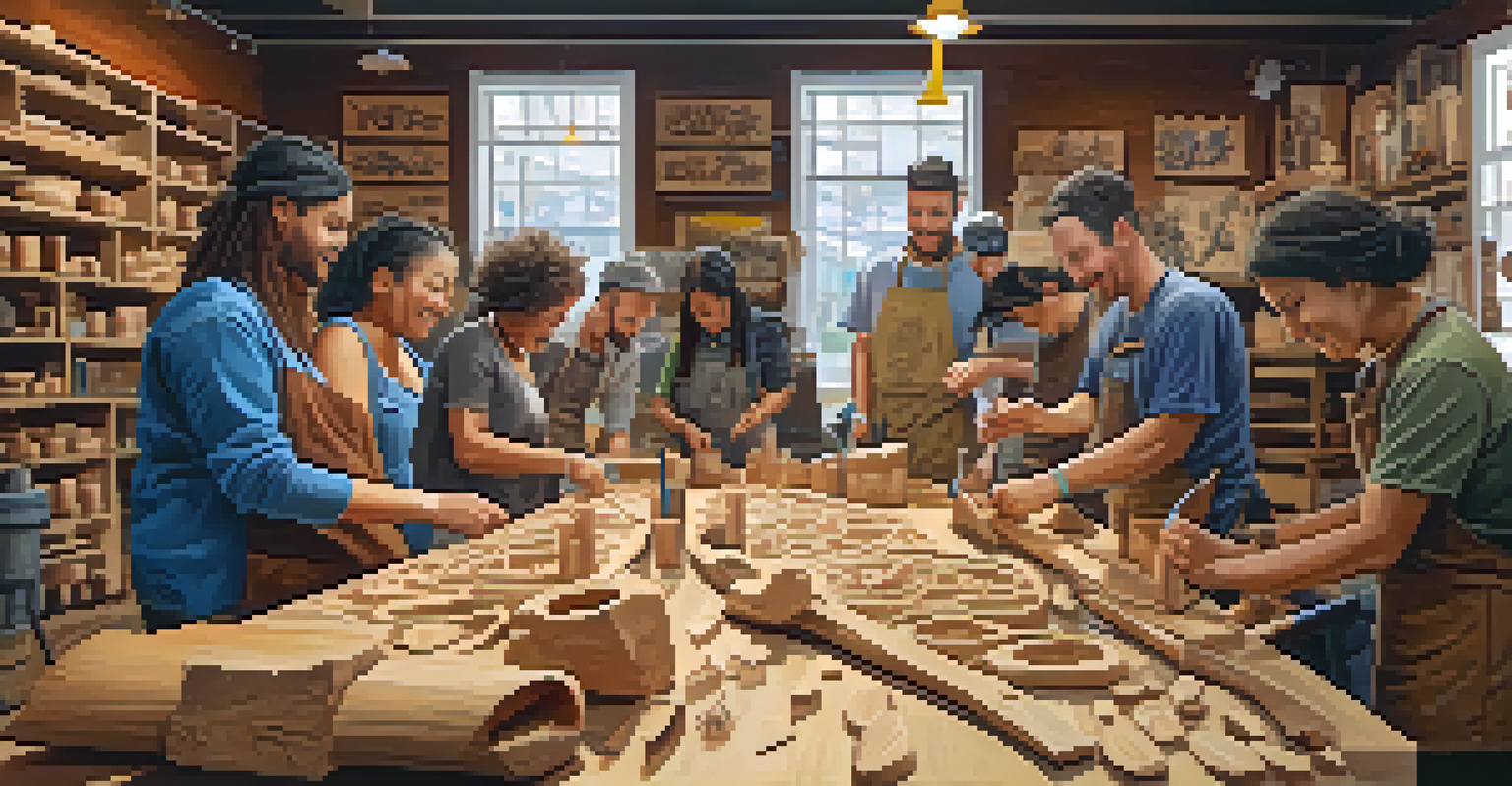The Therapeutic Effects of Carving on Mental Health

Understanding the Basics of Carving and Mental Health
Carving, a form of artistic expression, involves shaping materials such as wood or stone into intricate designs. This practice has been used for centuries, not just for creating art, but also as a way to promote mental well-being. Engaging in a hands-on activity like carving can provide a sense of purpose and fulfillment, especially for individuals facing mental health challenges.
Art is not freedom from discipline, but disciplined freedom.
When people carve, they enter a state of flow where they can lose themselves in the process. This meditative quality can help reduce anxiety and depression, allowing individuals to focus on the tactile experience rather than their worries. It’s like a form of mindfulness, where the act of creating becomes a therapeutic escape from daily stressors.
Moreover, the tangible results of carving can boost self-esteem. Completing a carving project offers a sense of accomplishment, reinforcing positive feelings about oneself. This can be particularly valuable for those struggling with self-worth, as creating something beautiful can serve as a reminder of their capabilities.
The Mindfulness Aspect of Carving
Mindfulness is about being present in the moment, and carving naturally encourages this practice. As carvers focus on each stroke and detail, they become more attuned to their surroundings and their emotions. This heightened awareness can lead to a reduction in anxiety and an overall sense of calm.

The rhythmic motions involved in carving can also have a meditative effect, similar to repetitive tasks like knitting or gardening. Each cut and shape requires concentration, drawing attention away from racing thoughts and negative emotions. This focus allows individuals to experience a break from their internal dialogue, fostering peace of mind.
Carving Enhances Mental Well-Being
Engaging in carving promotes mindfulness and reduces anxiety, serving as a therapeutic escape from daily stressors.
Furthermore, the sensory experience of carving—the feel of the wood, the sound of the tools—can ground individuals in the present moment. By connecting with these physical sensations, carvers can cultivate a deeper sense of relaxation, making carving not just an art form but a therapeutic practice.
Carving as a Form of Emotional Expression
Art has long been recognized as a powerful tool for emotional expression, and carving is no exception. For many, the act of shaping materials can serve as an outlet for feelings that are difficult to articulate. Whether it’s joy, frustration, or sadness, carving allows individuals to channel their emotions into a physical form.
Creativity takes courage.
This form of expression can be particularly beneficial for those who may struggle with verbal communication, such as individuals with anxiety or depression. By transforming emotions into art, carvers can gain insight into their feelings and experiences, promoting self-awareness and healing.
Additionally, the themes and symbols chosen during the carving process can reflect personal journeys, creating a narrative that resonates deeply with the artist. This storytelling aspect of carving can further enhance the therapeutic experience, as individuals explore and confront their emotions through their creations.
Building Community Through Carving
Engaging in carving doesn’t have to be a solitary activity; it can also foster community connections. Many individuals find joy in participating in carving clubs or workshops, sharing techniques and experiences with others. This sense of belonging can significantly improve mental health by reducing feelings of isolation.
Moreover, collaborating on carving projects can create a supportive environment where individuals can express themselves freely. Sharing ideas and receiving constructive feedback can enhance both skills and confidence, leading to personal growth. It's about creating a space where everyone feels valued and understood.
Community Connections Through Carving
Participating in carving clubs fosters a sense of belonging and emotional support, which significantly improves mental health.
The relationships formed through carving can provide emotional support and encouragement, which are vital components of mental well-being. As carvers celebrate each other’s successes, they build a network of camaraderie that can be incredibly uplifting.
The Therapeutic Benefits of Focus and Patience
Carving requires a level of focus and patience that many people find therapeutic. As carvers hone their skills, they learn to appreciate the process rather than just the end result. This shift in perspective can lead to a more fulfilling engagement with life, where the journey is as important as the destination.
The practice of carving can also teach valuable life skills such as perseverance and attention to detail. Overcoming challenges in carving projects can mirror personal challenges, offering lessons in resilience. Each mistake can become a learning opportunity, reinforcing the idea that growth often comes from navigating difficulties.
Ultimately, this focus on the present moment and the lessons learned through carving can translate into other areas of life. Individuals may find themselves more patient and able to handle stressors with greater ease, leading to improved mental health overall.
Creating a Personal Space for Carving
Having a dedicated space for carving can enhance its therapeutic effects. A personal workshop or corner can serve as a sanctuary where individuals can immerse themselves in the craft without distractions. This space allows for creativity to flourish and provides a retreat from the chaos of everyday life.
Decorating this space with inspiring tools, materials, and finished projects can also boost motivation. Personalizing a carving area can create a sense of ownership, further encouraging individuals to engage with their craft regularly. When one feels connected to their space, it can enhance the overall experience of carving.
Focus and Patience Aid Recovery
The skills developed through carving, such as focus and patience, translate into greater resilience and improved mental health.
Additionally, a well-organized workspace can minimize frustration and promote a sense of accomplishment. By having everything in its place, carvers can focus more on their art and less on logistics, allowing for a smoother and more enjoyable creative process.
Conclusion: Embracing Carving for Mental Well-Being
In conclusion, carving offers a unique blend of creativity, mindfulness, and emotional expression that can significantly benefit mental health. Whether it’s the meditative focus, the community connections, or the personal growth that comes from overcoming challenges, carving has much to offer. It’s a tool for healing that can be accessible to anyone willing to pick up a tool and start shaping their world.
As more individuals seek alternative methods to support their mental well-being, carving stands out as a fulfilling and rewarding option. With its ability to foster mindfulness, express emotions, and build community, it’s clear that there’s more to carving than meets the eye. The act of creating can pave the way for healing, growth, and connection.

So, if you’re looking for a way to enhance your mental health, consider giving carving a try. You may just find that this ancient art form can provide the therapeutic benefits you need to navigate life’s challenges.